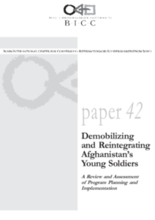The participation of children and youth in fighting forces is a common reality in many conflicts around the world. While the factors underlying the phenomenon of child soldiering are complex and multi-faceted, demobilizing and reintegrating young soldiers in the aftermath of conflict poses enormous challenges for civil society, governments, and the international community. Although UN agencies, international NGOs, national governments, and community-based organizations all have sought to provide protection and assist former child soldiers on their way back to civilian life through disarmament, demobilization, and reintegration programs, there is much controversy regarding the overall strategy success, and actual impact of such programs.
This report discusses debates between different actors and partners involved in the process of demobilisation and reintegration of former combatants in Afghanistan, and examines the planning, coordination and early implementation of UNICEF’s programme to demobilise and reintegrate war-affected young people within the overall framework of Afghanistan’s reconstruction process.
The paper concludes that significant weaknesses in programme strategy, design and implementation might hinder an effective and sustainable reintegration process.
The main findings and recommendations include:
-
The establishment of an independent, youth-specific D&R programme led to significant controversies and tensions among actors on the ground. However, this could have been avoided if national and international child protection NGOs, key government officials and the ANBP (Afghanistan’s’ New Beginnings Programme) had participated and engaged in the design of the D&R programmes
-
There is no reason why two independent DD&R (D&R) planning and implementation processes were established for adult and youth – the demobilisation and reintegration of young soldiers should be related to the ongoing adult programme. Both UNICEF and the ANBP need to have a close and coordinated working relationship
-
Increased communication is needed between all actors delivering programmes
-
Increased participation of the programme’s beneficiaries is needed to improve the success and sustainability of the D&R programmes
-
UNICEF should recognise the need for investment in family livelihood support, since economic insecurity has been identifies as one of the main reasons for youth involvement in the Afghan fighting forces
-
Skills training graduates should be provided with adequate tools to apply their skills into a profession. UNICEF should also foster the introduction of micro-credit schemes or access to both adults and youth.
©Bonn International Center for Conversion

